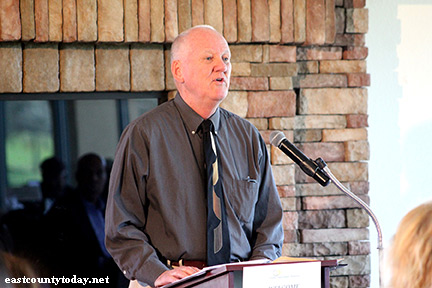This holiday season brings the usual cheer, but adds a personal festive exclamation point with the local bounty of school concerts. I was personally privileged to attend the Black Diamond Middle, Antioch and Deer Valley High Schools and Dozier Libbey Medical School combined concert and the Park Middle Schools performance. We had heard about the overflowing 1,300 students at elementary schools taking band but now we tasted the fruit of that pipeline.
We’re in our third year with music alive and well in the AUSD and are reaping benefits in more ways than one. As might be expected, motivation took a hit when the heart and sound that can soften the daily grind was taken from the schools to save dollars and allow doubling down on core subjects. Granted, reading and math remain fundamental, but face it, for many kids, music or sports are the sole connection and engagement keeping them from truancy.
Aside, though, from increased attendance and GPA, we’ve noticed that, in and of itself, music is aiding academics as a sort of super brain food, bringing a plethora of values. No surprise to us music lovers as poll any group of physicians or engineers and you will find that an amazing number of these hi-acheievers had studied music in their formative years.
You see, in one sense music is pure math. Understanding beat, rhythm and scales helps children learn how to divide, create fractions and recognize patterns. It sharpens spacial temporal skills associated with math comprehension. Essentially, then, music is a sort of hard wiring for all kinds of basic and advanced math.
Studying music also instills short and long term memory aides by using mnemonic devices. It also physically develops the left side of the brain, the part involved in language acquisition.
Music employs multiple skill sets, exercising eyes and ears and both larger and smaller muscle sets. Certain instruments, like percussion, develop timing, coordination, motor skills and ambidextery. Call it sports in a chair!
Good news moms and dad; a 2007 study by Christopher Johnson at the University of Texas showed students in elementary schools having superior musical programs scored 22% higher on standardized English tests.
So called soft skills, cited by employers as invaluable workplace skills, also mature. Musical student attendance is cumulatively higher and discipline rates less. Poise under pressure and accepting and giving constructive criticism also benefit, The habits of discipline, perseverance and the ability to demonstrate deferred gratification also develop.
Musical students learn teamwork and collaboration in group performance, and how to patiently wait their turn and respectfully listen to others. They also broaden horizons as they are introduced to various genres, styles and cultures.
We might ask, how, then, does our child pick a chosen instrument? Treat it like a petting zoo and let your child explore for the right sound, feel and tempermentel fit. Make sure the challenge is appropriate, the price affordable, and that you, the parent, can live for endless hours without going crazy over home practice of that instrument. Drums, after all, may not fit us all.
Thankfully, with School Board support, and LCAP funding, we have welcomed back the spiritual soundtrack of our lives. The enrichment surely can’t hurt our kids and our collective humanity. It’s an opportunity to celebrate as we affirm Frederick Nietzsche’s charge that “without music, life would be a mistake.”
Walter Ruehlig
President, Antioch School Board


2 comments
Must be a slow news day. This guy is a whacky as his wife.
Well spoken , Walter.
Comments are closed.